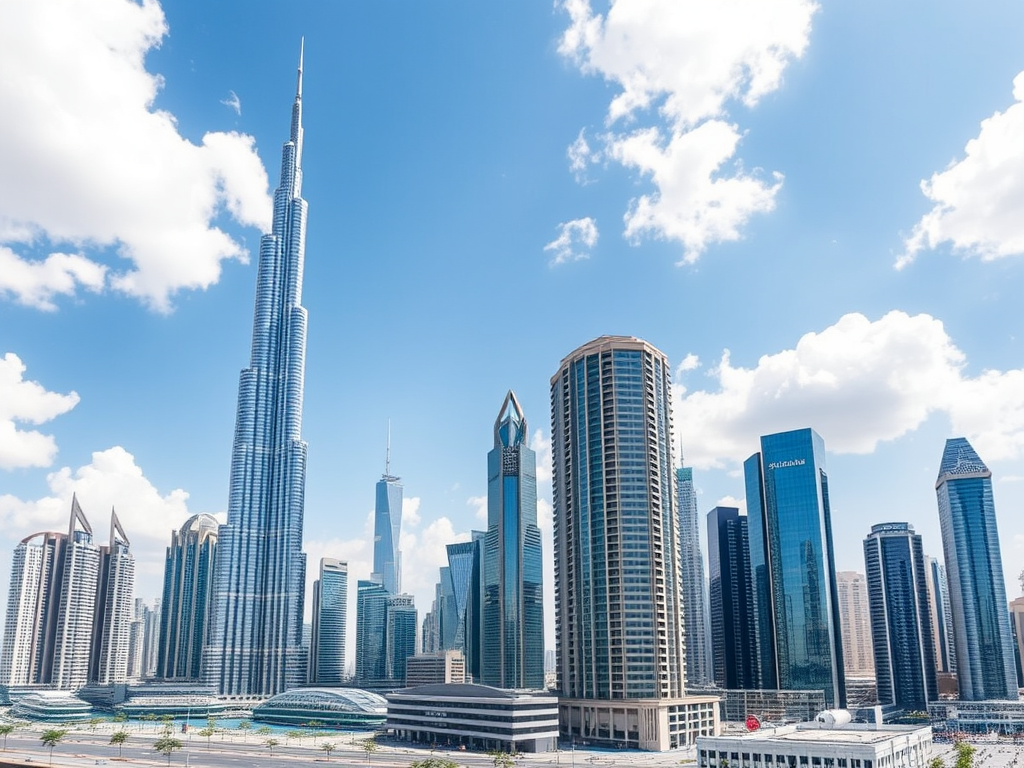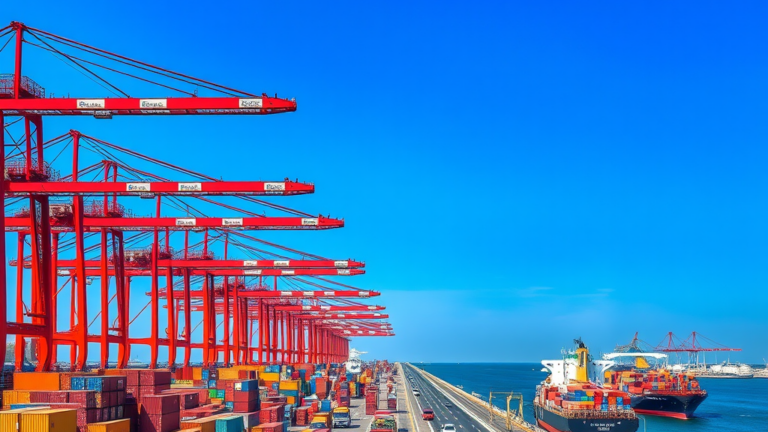Dubai is not just a city of stunning skyscrapers, but also a powerhouse that plays a vital role in the Gulf Cooperation Council (GCC) trade network. The GCC has been instrumental in fostering economic ties among its member states, and Dubai, with its strategic location and robust infrastructure, is at the forefront of this regional collaboration. Situated at the crossroads of Europe, Asia, and Africa, Dubai’s unique geographical advantages allow for seamless trade linkages, giving it a competitive edge in international commerce. With a diverse economy driven by sectors such as tourism, real estate, logistics, and finance, Dubai attracts businesses and investors from all over the globe. This influx has significantly transformed Dubai into a regional hub that influences trade dynamics within the GCC. Understanding Dubai’s role in this trade network unveils insights into opportunities and challenges that shape the commercial landscape of the Gulf region.
Overview of the Gulf Cooperation Council (GCC)

The Gulf Cooperation Council (GCC) was established in 1981 with the goal of fostering greater economic, political, and social integration among its member states: Saudi Arabia, Kuwait, the United Arab Emirates, Qatar, Bahrain, and Oman. The main objectives of the GCC include promoting economic cooperation, enhancing regional security, and cultivating cultural ties. Through various initiatives and agreements, the GCC strengthens inter-member trade relations, paving the way for a unified economic bloc that is increasingly influential on the global stage. As of now, the GCC economies are seeing a resurgence in intra-regional trade, thanks to policies aimed at enhancing cooperation and minimizing trade barriers. This unified approach has positioned the GCC as a significant player in global economic discussions. The integration within the GCC is critical for member nations, especially in responding to external economic challenges.
Dubai’s Economic Landscape

Dubai’s economic structure is characterized by its diversification strategy, which has been pivotal in lessening dependence on oil revenues. The emirate has effectively shifted its focus towards sectors like tourism, hospitality, and logistics, while also nurturing a vibrant services sector. Recent statistics reveal that non-oil sectors now contribute over 70% of Dubai’s GDP, highlighting an impressive transformative journey. Notably, the real estate market, with its modern architecture and luxury offerings, continues to attract international investments, further catalyzing economic growth. In addition, Dubai’s world-class infrastructure and sound government policies provide a conducive environment for business operations. As a result, Dubai has earned a reputation as an ideal location for start-ups and multinational corporations looking to tap into the GCC market.
Dubai’s Strategic Location and Infrastructure Advantages
One of Dubai’s most significant advantages in the GCC trade network is its exceptional strategic location. It serves as a bridge connecting Asia, Europe, and Africa, facilitating effortless trade routes. Not only does this location offer accessibility, but it is also complemented by cutting-edge transportation infrastructure that includes:
- Dubai International Airport, which is among the busiest in the world.
- Jebel Ali Port, the largest man-made harbor globally and a vital logistics hub.
- A network of modern roadways ensuring smooth intra-regional transit.
Additionally, Dubai’s numerous free trade zones allow businesses to operate with minimal restrictions, resulting in an increase in both local and foreign investments. These zones offer various incentives such as 100% foreign ownership, full profit repatriation, and no corporate taxes. Such features make Dubai an enticing destination for international firms looking to enter the GCC market. Furthermore, the emirate boasts excellent connectivity, not only within the region but also linking to global markets, cementing its role as a trade nexus.
| Key advantages of Dubai’s trade network | Impact on GCC trade |
|---|---|
| Strategic geographical location | Facilitates efficient logistics and supply chains |
| Advanced infrastructure | Reduces costs for businesses and enhances productivity |
| Favorable trade policies | Encourages foreign investment and business expansion |
Trade Policies and Regulations in Dubai
To ensure a flourishing trade environment, Dubai has instituted progressive trade policies and regulations aimed at enhancing commercial operations within the GCC framework. One of the notable features is the establishment of free trade agreements (FTAs) that eliminate tariffs and encourage trade-flow among member states. Such policies not only ease the trading process but also foster economic cooperation and innovation among GCC nations. In addition, Dubai maintains an efficient customs system that is pivotal for expediting the entry and exit of goods. The customs procedures are designed to be user-friendly, ensuring that businesses experience minimal delays. Investment in technology has further streamlined these processes, allowing for real-time tracking and better compliance with international standards.
As one of the world’s largest and most efficient free zones, Jebel Ali Free Zone Authority (Jafza) plays an essential role in Dubai’s trade ecosystem. This free zone is critical for attracting foreign direct investment (FDI) into Dubai, offering a diverse range of incentives for businesses operating within it. Companies registered in Jafza enjoy numerous benefits, including:
- Tax exemptions for a specified period.
- Access to a vast customer base across the GCC.
- Logistical support and services that facilitate trade.
Several success stories of multinational corporations have emerged from Jafza, serving as a testament to the opportunities it provides for businesses. Companies leverage Jafza’s advantageous position to optimize their supply chains, cut down on logistics costs, and significantly enhance their operational efficiency. This synergy of trade practices underscores the significance of Jafza in solidifying Dubai’s position within the GCC trade network.
Dubai’s Contribution to GCC Trade Volume
Dubai’s impact on the trade volume within the GCC is substantial, as evidenced by continued growth in trade figures. Recent statistical data shows that Dubai has consistently led intra-GCC trade, stimulating economic activities that benefit not just the emirate but the broader Gulf region. Key commodities traded within the GCC include:
- Petroleum and petrochemical products
- Consumer goods
- Construction materials
- Electronics and machinery
This increase in trade volume signifies a thriving collaborative effort among GCC countries, with Dubai often acting as a central hub for redistribution and logistics. The enhanced trading relations foster economic collaboration, leading to greater regional stability and prosperity. Though challenges exist in the global context, Dubai’s proactive approach to trade policies will likely further solidify its essential role in the GCC trade network.
Challenges and Opportunities in the GCC Trade Network
Despite the many advantages that Dubai enjoys as a trade hub, challenges remain within the GCC trade network. Economic fluctuations, both regionally and globally, can significantly impact trading volumes and business profitability. Furthermore, there are regulatory challenges that arise from differing trade practices among GCC member states, which can create complexities for businesses. However, amidst these challenges lie numerous opportunities for innovation and growth. With advancements in technology, the potential for digital trade solutions has greatly expanded. Moreover, sustainability initiatives integrating green practices into commercial operations are gaining traction, reflecting a shift towards long-term stability and accountability in trade.
Conclusion
Dubai stands as a cornerstone of the Gulf Cooperation Council’s trade network, driving economic growth and regional collaboration. The emirate’s strategic initiatives, adaptable regulatory environment, and commitment to infrastructural development position it as a leader in the GCC trade landscape. While navigating challenges, Dubai continues to evolve, showcasing resilience and adaptability in an ever-changing market. The integrated approach among GCC nations is pivotal for creating a thriving and cooperative trade ecosystem that benefits all member states. As Dubai continues to enhance its role within the GCC, it promises a robust future in regional trade and economic stability.
Frequently Asked Questions
- What is the Gulf Cooperation Council (GCC)?
The GCC is a political and economic alliance of six Arab states in the Gulf region aimed at fostering economic collaboration and regional stability. - Why is Dubai considered a trade hub in the GCC?
Dubai’s strategic location, advanced infrastructure, and business-friendly policies make it a critical trade hub within the GCC. - What are the key industries driving Dubai’s economy?
Major sectors include tourism, aviation, logistics, finance, and real estate. - How does Jafza contribute to Dubai’s economy?
Jafza attracts foreign investment, enhances trade operations, and provides a platform for international businesses to thrive. - What challenges does Dubai face in the GCC trade network?
Challenges include economic fluctuations, regulatory inconsistencies among member states, and evolving global trade dynamics.




